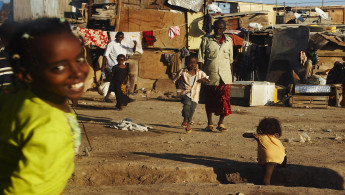Yemenis flee to Djibouti and Somalia to escape war
In Yemen's al-Makha sea port, Amin Qassem Hadi and his family carried their luggage and rushed to catch the boat for a one-way trip out of Yemen, leaving behind their house after arranging to stay with a relative in Djibouti.
The port manager, Qassem Mahdi Haidar, said that more than 150 people leave Yemen legally every day. Some cross to Djibouti, while families who fled war in Somalia decades ago are now taking the return trip to flee war in Yemen.
But smugglers have also done well from the Saudi-led military campaign in Yemen, according to Ammar Said, a ship captain who works at al-Makha port.
"We have now become refugees in the countries of the refugees we used to receive," Said told al-Araby al-Jadeed. "More then 400 people are smuggled out of Yemen every day on medium-sized boats owned by Yemeni merchants."
| We have now become refugees in the countries of the refugees we used to receive. -Captain Ammar Said |
Said said that the boats carry 200 people and 600 tons of merchandise. If caught, carriers face fines of between $50-$90 per person being smuggled.
The trip from Yemen to Somalia takes 16 hours, and 12 hours to Djibouti, which made pharmacist Mukhtar al-Sharqali choose the latter.
He agreed the journey with the famous Bab al-Mandeb smuggler Mohammad S, who works as a maritime agent at the port and has extensive knowledge of smugglers and smuggling locations.
Sharqali told al-Araby that his two friends, who travelled with him, did not have the necessary papers, visas or even passports to leave through the official port of exit. Thus, he had to coordinate with the smuggler, who had become like "a taxi driver in Sanaa".
"Many people manage to leave through smuggling", Fahd al-Khalidi, Bab al-Mandeb's security chief, told al-Araby.
Refugee statistics
A report on smuggling documented the departure of 1,325 people towards Djibouti and Somalia in the period between the start of operation Decisive Storm and 10 April, which was confirmed to al-Araby by the manager of al-Makha.
However, Mujeeb Hassan, the spokesmen for the UN refugee agency UNHCR in Yemen, told al-Araby that more than 900 people had arrived in Djibouti and Somalia since the start of the Saudi operation. That figure includes 463 documented Yemenis.
Hassan added that among the documented cases was the case of a group of 247 people (85 men, 93 women and 69 children) who arrived by boat to the autonomous Somali region of Puntland on 10 April, having been smuggled from al-Mukalla in Hadhramaut, south of Yemen.
"Among the people on the boat was a pregnant woman, who was rushed to a medical centre upon arrival, in addition to a number of old and disabled people who also received medical attention, he said."
Conditions on smuggling boats are quite harsh, and the women and children on the boat from al-Mukalla ran out of water on their journey, Hassan said.
Smuggling routes
There are three main smuggling routes in Bab el-Mandeb, all within a short distance of al-Makha port, according to Makha resident Ahmed Mukaiber. These routes are also used to smuggle weapons and other goods into al-Kabha, Wahja and Ghariza, which are considered to be lawless areas suited for smuggling, according to the director of security for Bab-el-Mandeb, Fahad al-Khlaidi.
| The UNHCR has announced an increase in the number of people escaping Yemen from the Gulf of Aden to countries in the Horn of Africa. |
Khlaidi said the 180km-long Bab-el-Mandeb was open to smugglers.
"It is not subject to security supervision, not even 10 percent of it, despite the presence of the coast guard and the 35th and 17th Brigades in the isle of Perim [Mayyun], however none of them have performed their security duties for years."
Khlaidi added that weapons, drugs, oil and people were smuggled through these routes.
He said international ships had been entering Yemeni waters and unloading weapons in the last few weeks.
"We tried to inform the southern regional command, the navy and the coastguards, whose work has been halted by the Houthis, however there has been no movement," he said.
At the destination
The manager of al-Makha port said that Yemenis who arrived in the ports of Berbera or Bosaso in Somalia, or in Djibouti, were received by the local authorities in coordination with the UNHCR and the International Organisation for Migration, and then transferred to refugee centres.
The UNHCR, in cooperation with a local charity in Djibouti, give given blankets and food and told where they can recieve further help.
The UNHCR said the agency was looking for a location in Djibouti to house the refugees, adding that the refugee centres were currently in need of long-term food supplies, given the daily increase in refugee numbers.
This is an edited translation from our Arabic edition.



